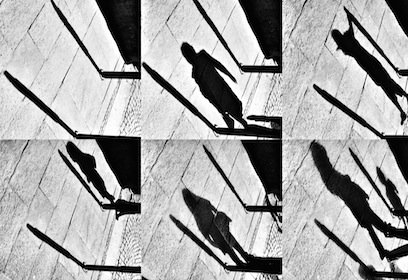The Sleep of the Righteous
Wolfgang Hilbig, translated by Isabel Fargo Cole
Two Lines Press, $14.95 (paper)
Most languages don’t delineate between “game” and “play.” German’s Spiel, for example, suffices for both. But games are social institutions—exercises in hegemony, cohering with this or that status quo—while playing, well, playing is spontaneity, even subversion. This distinction animates the writing of Wolfgang Hilbig, whose work saw its English debut last year with an autobiographical collection of stories, The Sleep of the Righteous, and a novel, I.
Equal parts paranoid and melancholy, Hilbig’s fiction emerged in East Germany as part of the Bitterfelder Weg, the Socialist Unity Party (SED) cultural program launched to bring together authors and workers so that GDR literature might acquire a more authentic proletarian perspective. The SED sought to encourage the working class, empowered by the GDR’s cultural programs, not just to exercise the industrial strength of the communist national project but to surmount the bourgeois stranglehold on culture. Writers like Hilbig—boiler room stokers from small towns such as Meuselwitz—could then partake in capital-C Culture, and through their efforts define a national literature, dispensing with the alienation of factory workers and artists. A utopia of aesthetics. But where the Bitterfelder Weg and its proponents in Walter Ulbricht and the Central German Publishing House (der Mitteldeutscher Verlag) hoped to augur a flawless, German brand of socialist realism, they found a troublesome consequence in Hilbig.
For Hilbig, the state is a game. The Soviet Project is a game. So is the factory, the tenets of Socialist Realism, the dance one does to protect those most private corners of self from Stasi—even fiction, for that matter. Hilbig’s oeuvre is one of defiant play, and the organizing principles of life in the GDR were just that, fictions. Hilbig saw these for what they were: strictures, confinements. Like an informant for the rest of us, he would pry them open. And while the great worker-poet wasn’t overtly critical of state power, at least initially, he wasn’t one to vapor on about the supremacy of an allegedly more-equitable society, either. Far from it—The Sleep of the Righteous conjures a near-insurmountable bleakness.
In the late 1970s and early ’80s Hilbig published poems and collected stories almost exclusively in West Germany—without permission from GDR officials—largely avoiding the publications of the East. He was fined and served time in jail (though the imprisonment was, ostensibly, for incidents of violent behavior). A persecuted East German writer adored in the West, he was awarded the Brothers Grimm Prize in 1983, which he agreed to accept in person in Hanau—again, without state approval. This defiance of strict regulations for authors drew the ire of then Deputy Cultural Minister Klaus Höpcke. Not wanting to stir controversy or showcase the author’s repression to the world, the ministry granted him leave to accept the prize, with the caveat that he go accompanied, and observed, by his publisher, and that he was not to level any criticism against GDR in his speech.
Hilbig’s stories are about writing in a repressive state and the inherent cruelty of language.
Hilbig’s work eventually saw East German editions as well, but not without rigorous oversight; the fear that Hilbig might corrupt the young and robust tradition of German socialist realism never quite exhausted itself. Stories and poems were omitted, and the reception of his books was heavily regulated, with small print runs and prepared reviews skeptical of what they pegged as a nihilistic and reactionary worldview. On Hilbig’s supposedly socially irresponsible melancholy, the SED’s Director of the Cultural Department Ursula Ragwitz had this to say:
His worldview and artistic positions are distant from our ideology. By taking up reactionary and late-bourgeois traditions . . . [he] uses dark colors and pessimistic tones to diffuse a nihilistic and melancholy outlook on the world and on life . . . Since he gives voice to resignation, loneliness, sadness, suffering, and a yearning for death, Hilbig’s commitment to humanism can also be questioned.
Hilbig’s fame in West Germany grew accordingly with the bureaucratic headache in the East, until, ultimately, Hilbig was permitted to leave to the FRG in 1985. He never returned to the GDR. (Robert Darnton’s Censors at Work (2014) gives a much more thorough account of all this, along with the Betterfelder Weg, and German socialist realism.)
But what was this “late bourgeois” tendency, this murky temperament betraying only the most dubious commitment to humanism? Originally published in 2002, well after “the end of history” and release of Stasi files, The Sleep of the Righteous eschews Ostalgie (a portmanteau of the German for east and nostalgia) for the GDR. While the book teeters on bitter reproach, Hilbig, not unlike W. G. Sebald or László Krasznahorkai, was keen to plumb the politics of memory and its state after the Cold War. The collection’s opening story, “The Place of Storms,” recalls, through many characteristically long, unfolding sentences, the Meuselwitz of Hilbig’s youth: “Between the sidewalks was but a straight track of sand, perhaps once light, now since times unknown black-gray, as though in proof that a mix of many colors ultimately yields darkness.” The locale lives in an ash cloud, and barefoot children wade through the mud of rain and coal dust, clambering through the “rubble from bombed-out houses.” This is far from a robust utopian vision, hardly the kind of “objective” representation the GDR’s cultural institutions had hoped to find in its realism. (Hilbig’s narrator often lapses into moments of what he calls “unreality.”) The story moves through scenes from a boy’s youth. He covets pulp Western novels from West Germany, and the older children annex him from his friends when they learn of his grandfather’s fabled rifle stored away at home, which they hope to see.
The exhaustive sentences, which open and unfurl at great length, ride with images of decay—bleak, of course, but useful as apertures through which we can explore layers of concealment, poking around for secrets, histories, and modicums of truth among the fictions and fears of authoritarianism. These endeavors can horrify, they can evoke banality, and, even worse, locate horror in the banal. These stories are to a large degree about writing in a repressive state and the inherent cruelty of language, which either obfuscates the truth or betrays it: a mere utterance can lay bare the deepest recesses of self to Stasi, a persistent and looming threat. These are the everyday conditions of surveillance that Hilbig and his generation knew all too well. But even more, the very fabric of The Sleep of the Righteous is an instantiation of this anxiety, an exercise in memory, and a meditation on the struggle between concealment and excavation. (Spielen is also German for “to act.”)
The structural foundation of the text is the nature of concealment. The first story opens with a panning shot—of Meuselwitz presumably—and closes in on a young boy’s private life, into which the older boys pry, and scenes of Germans “dumping their ash and their rubbish in the ruts of [the] street by night.” The story ends with the boy, now an adult, musing on writing:
Writing resembled swimming. . . . In similar fashion you swam off with your words, born up by the blood-warm written words as over the surface of a mine pit smelling of coal and rot . . . only that there seemed to be no far shore for these words, with the words you had to swim on and on, until the words ended by themselves, until the words themselves went under.
Through the rest of the collection, until the final stories, we navigate these interiorities of self here established, now exposed. In “The Bottles in the Cellar,” a man is overcome with grief about his cellar—more specifically, the stored bottles, which
loomed in the semidarkness of the cellar; suddenly, when one dared to look, there were many more bottles still, still more of these pyramids had been started, but foundered, they had collapsed upon themselves, dark green glass had poured out beneath the shelves, it seemed the shelves themselves, crammed full of bottles, had been washed up by glassy waves to freeze, unstable and askew, upon a glassy gelid flood that had rushed shrilly singing to fill every corner.
Hilbig’s fictions maintain an underlying paranoia, and even his sentences formulate a dual openness and obscurity as they run across the pages, like the chasms they are, until ultimately we find ourselves nearing the end, or the bottom.
The penultimate story, “The Memories,” is a model for the entire collection. It opens with a writer, known only as C., a boiler room stoker, writing letters to strangers “composed of evasive, overcautious replies to questions no one had asked. . . . It seemed he was merely answering his own questions.” An inverse of the first story, it works its way back out into the world, to a trip to deposit mail, through the workers in the factory wing (“And shut away within, we probably held the knowledge of all the nameless generations before us that had sat just like this in the dark winter mornings, man and woman, waiting mute and servile for the urgent start of the workday to part them”), and through memories of his grandmother (“C. asked himself at times how many memories were sealed within her, in the withered, forbidding old woman’s body from which nothing emerged to the outside”). Bodies, memories, and boiler rooms are vessels of information, curiosities. Through C. we observe a queering of their banality, those we’ve come to find as strange only in their suppression.
But nothing is so curious for C. as Gunsch, a fellow stoker and an immigrant; he hardly speaks German, and C. and his coworkers know nothing of his life outside the factory. They debate the facts surrounding his private life, and even his words are subject to interrogation. In one instance Gunsch is heard yelling “Holéra! Holéra!”—Romanian for cholera, which C. considers, but isn’t entirely sure. He presumes that he shouted the word “because it resembled the German word Kohle, the term, that is, for the stuff at which they slaved each day, which filled their lungs with black deposits and forced black sweat from their pores.” Language itself lives in a surveillance state—the way meaning is ascribed, the way it plays by the rules of a game we call grammar in order to work. But, how well does it work? Gunsch is still a mystery—almost entirely conjecture—despite his capacity for speech, just as is C. to Gunsch, and C. to us. Perhaps the most befuddling part of this story is the volley between first and third person, sometimes in the same paragraph. Like an open boiler in a factory’s pit, Hilbig takes names, shorthand for the subjectivities contained therein, and flays that very basic certainty of perspective—the fixity of a particular pronoun (be it he/she/they or I)—we so take for granted when reading. His characters are paranoid, if not tortured, and painstaking are the efforts we must make to endure their innermost experience, despite the ostensibly easy access granted by the words that shape it. And here one locates a fundamental sadness in Hilbig’s work: the power of words to betray as well as to bury. As Christa Wolf—herself heavily surveilled, herself an informant—wrote in Accident: “Everything I have been able to think and feel has gone beyond the boundaries of prose. . . . We cannot write the same way our brains work.”
For Hilbig, the working lives at the core of Bitterfelder Weg are there to be undone—not insulated—by writing. In doing so, he affects a frantic exhaustion, not entirely unlike that of Chaplin at the conveyor belt in Modern Times. And there is a brilliant symmetry at work in The Sleep of the Righteous. We begin on the streets of Meuselwitz; we enter the abodes or workplaces of its denizens and are led into the most private sections, its boiler rooms and bedrooms. He ushers us through these spaces until we work our way back out into the factory, the apartment, and into the streets of Berlin in its closing pages. This passion play of interior and exterior laments the impossibility of private life, and the violence of cracking it open, which translator Isabel Fargo Cole navigates with grace.
Hilbig’s “late bourgeois” tendency—the idea that radical aesthetics are concomitant with radical politics—was much maligned by his detractors in the Ministry of Culture. But this friction is not an issue of irresponsible representation of the working class experience; it is something inherent to writing, which Hilbig saw as a workshop—a factory, even—in which the raw materials of life are ground down and assembled into text. Language is that codified game in which society, proletarian or otherwise, becomes possible, mediating both our deepest interiors and the so-called objective truths of modern living. Hilbig’s defiant productions craft new systems from the existing practices—labor, surveillance, speech—he was meant to endure during his lifetime.
The Stasi—or the NSA, or digital marketing algorithms, for that matter—commodified the most precious corners of what makes us us. Hilbig, the bastard child of socialist realism, triumphantly turns these offenses back on themselves. He could very well be the writer for our time, more so than most still living, and the Anglophone world is lucky to have this peek into his dossier.








